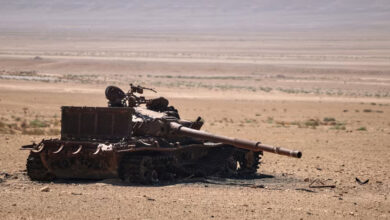The United Nations' first relief airlift to Syria from Iraq will deliver food and winter supplies to the mostly Kurdish northeast this week with the permission of both governments, the UNHCR refugee agency said on Tuesday.
The airbridge, using Ilyushin-76 commercial cargo planes to Hassakeh from Arbil in northern Iraq, will begin on Thursday. Up to 12 flights are scheduled through Sunday, said Amin Awad, director of UNHCR's Middle East and North Africa Bureau.
U.N. agencies have ferried limited aid supplies into Syria from Iraq and Lebanon, but not via Turkey because of objections from President Bashar al-Assad's government.
"This is the first time aid goes through Iraq," Awad told Reuters in an interview in Geneva.
Syria gave permission about two weeks ago for the cross-border U.N. operation from Iraq into Syrian Kurdish areas of Hassakeh province, which had initially envisaged truck convoys via the Yarubiya border crossing, a cheaper option, he said.
"As the situation was very complicated, negotiating with many factions, we shifted to an airlift," Awad said, noting that one main Kurdish group in the area was pro-Syrian government and the other pro-Turkish.
The cities of Hassakeh and Qamishli are to receive food and relief items as a harsh winter sets in, he said. The cargo will also include blankets, kitchen sets, plastic tarpaulins for shelter, sleeping mats, and jerry cans, a UNHCR spokesman said.
"The number of vulnerable people in Hassakeh is estimated at 50,000-60,000 but we are still doing assessments. Hassakeh has been out of reach for a long time," Awad said.
Awad said the United Nations was still "lining up airlines that are willing to fly into that part of the country".
Well over 100,000 people have been killed in the conflict in Syria, which began with peaceful protests against Assad in March 2011. The UNHCR says about 6.5 million people have fled their homes within Syria and 2.3 million have sought refuge abroad.
"Winter is here. This is one of the harshest winters according to any forecast that you may get hold of, probably in the last 100 years," Awad told a news briefing.




